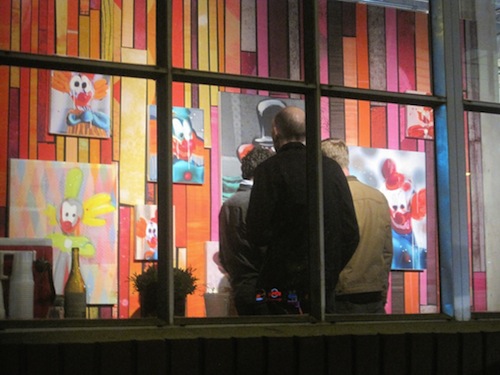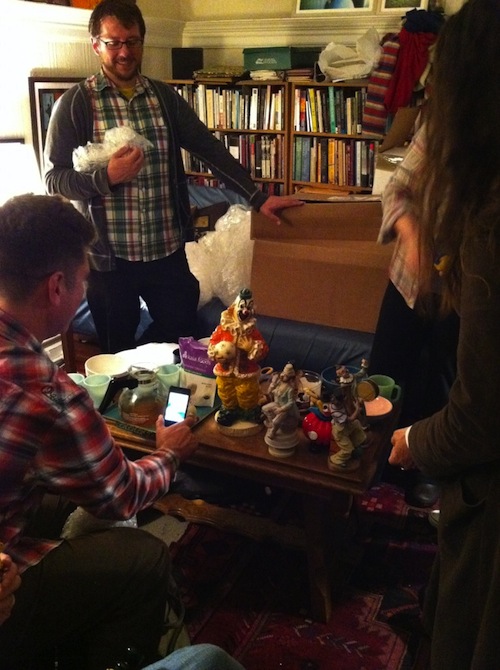Poetry and Humor, for Megan Brian

Only one thing is as dreadful as a poetry reading meant to awe that falls flat, except for one thing, he who tries to write a funny little essay. Instead I write today on two topics that have fascinated me for years.
From the time I became aware of myself as a Lacanian infant, painfully trying to separate myself from my mother’s body during the so-called “mirror stage,” I tried to develop a sense of humor about it. In the 1950s that was very prized, the famous “sense of humor”? Later in life I heard people talk about sense of humor most often in trying to set up blind dates, as in, “Oh Kevin, you’ll have to meet”—well, let’s call him “Josef”—"he’s got such a good sense of humor.” And despite the fact that one prides oneself on one’s own sense of humor, one digs in one’s heels when one hears of a good sense of humor imputed to another. In this context a sense of humor is the equivalent of ugliness, or a minimal sexuality like lint on your lapels. Something you could brush off with one whisk of your fan. A Joe Jonas sort of sexuality. I walked up to the mirror and touched it with my hands and saw, that was another little boy, and yet it was part of me the way that I would always be part of my mother in that I came, luckily healthy, from her womb—the birth canal.
Freud said that jokes are based on aggression, whereas Henri Bergson said humor is based on reversal, either temporal or power-based. In some sense the most Bergsonian of all plots was the Vice Versa plot of Victorian times, what we now know as the Freaky Friday story, in which parent and child swap bodies. You’ve probably been reading the newspapers where that one scholar said she had uncovered the evidence that proves that Mark Twain based Huckleberry Finn on a little black urchin he met on the street. I picture this boy as the Jaden Smith or Lil Bow Wow of the 1850s. Well, I don’t know if the real Huck was black, but I know he was a poet. I’m talking about his humor—his defensiveness, his outsider status, his resiliency, his insult comedy, the exposure of hypocrisy, the comic exaggeration, the tremendous verve and sweep of his narration and exposition. His anger. In Huck Finn we recognize ourselves, in the margins of American life, ferocious, trenchant and, in Gramsci’s famous phrase, as pessimists of the intellect, optimists of the will.
You know what I mean—there’s this sense that everything is so terrible, but still there’s this place in our hearts that persists in seeing the funny side of it all—or the hopeful side. Nobody feels this the way poets do, well, except for gay men and lesbians, etc. That sense of hope. Without a crazy hope there wouldn’t be any gay men or lesbians at all—we’d all have killed ourselves at, say, age eight—which is what they want us to do, so in a sense we’re here living out lives of spite! I’m talking about humor as a tool of survival. Don’t you feel like a pinball in a big machine that’s shot you to the top but depends for its fun quotient on seeing that you bang, bang, bang all the way to the bottom? That’s our position within the dominant culture. Let me talk just a little bit more about humor, and how it gets short shrift from this mass culture, so that for example you don’t hear people saying that Billy Wilder is a director far greater than someone like Tarkovsky. Nevertheless when I ask myself for my own opinion of “humor,” I confess than I find myself thinking of it as the rambunctious kid brother of the “serious.” I remember when I was a little boy I liked Beaver Cleaver but I was in love with the older, more staid Wally—and although erotic signs have changed considerably in 50 years, Wally remains the ne plus ultra of a certain kind of fuckability, a glamor of seizure. It’s the child, however, who sees through the pretensions of the adult, and that’s why I don’t care much for children no matter how cute.

I don’t want to waste a lot of time on examples of great poets whose work I find funny—because what one finds funny is a private thing. I know some who are still laughing at Liza Minnelli’s hijinks in Arthur and Arthur part 2. Going back to Freud’s model, I want to address the question of how we can wrest humor out of bleak circumstance. Let’s take a historical view. I can remember when Susan Sontag wrote her “Notes on Camp,” which, in the 60’s, was the most readily identifiable strain of gay humor available to her, or to most of us I guess. Sontag’s definition of camp proscribed a certain narrowing of it to include the love of gay men for the things straight people despise—untalented stars, kitsch, false icons, trash. Now that it’s 2014 I see camp as a product of a society in which love was valorized above all other possible forms of emotional action. We were supposed to be meek then, all of us. We would inherit the earth. Now that I think of it, I imagine that’s why blowjobs were so popular then. All the guys I met were really into them. Fucking was regarded as too aggressive. I was disappointed in the 60s and I, like all my kind, delighted in the 70s. The odd thing is that this blowjob-loving peaceful hippie camp society 60s regarded itself as a giant step forward from the sexual passivity of the 50s, when even a blowjob was suspiciously aggressive. The men I knew who had come of sexual age in the fifties were into something the intellectual ones called the Princeton rub. But enough of my sex life, except insofar as I can trace a parallel between styles of radical sex and styles of comedy. Remember years ago when Edmund White, asked how artists should deal with AIDS, advised us to “avoid humor”—you know, because AIDS is no laughing matter. John Greyson, the filmmaker and activist of a younger generation, challenged White’s proscription, advised us all to harness the tremendous power of humor to break down the walls of indifference and corruption. If as Bergson says humor is based on reversal, this means that every time the little people gain an ounce of power from those who oppress us—it’s funny. It makes you laugh.
Are there links, in your work, between humor and narrative strategies? If you could find it in your heart to aspirate these publicly, how would that sound? Are those who follow a school or cult stupider than others? Or are they smarter, or at any rate wilier, than those who march to the different drummer’s beat?

Perhaps without the pressure of having to apologize for my existence as an intellectual person with an intellectual life allowed me to continue writing and to continue experimenting over the many odd years that ensued. I loved Helen Molesworth’s show of art of the 80s that I saw at the Museum of Contemporary Art in Chicago. There one saw it all, Cindy Sherman, Jeff Koons’ Rabbit, Raymond Pettibon, General Idea, Rosemarie Trockel, GB Jones, Mike Kelley and Paul McCarthy, an army of comedians fighting back out of rage and a denser social space. In this context even a Gerhard Richter looked like comedy, or David Hammons’ huge picture of Jesse Jackson with blonde hair and pink Tilda Swinton skin, asking, “How Ya Like Me Now?”
Poet, novelist, playwright, art critic, and scholar Kevin Killian earned a BA at Fordham University ...
Read Full Biography

